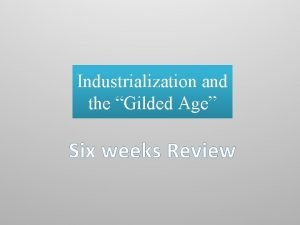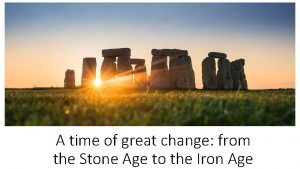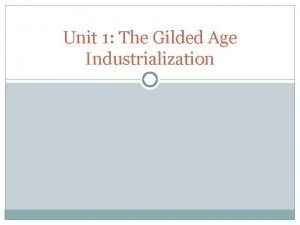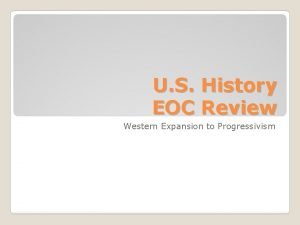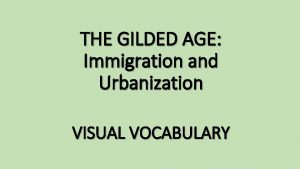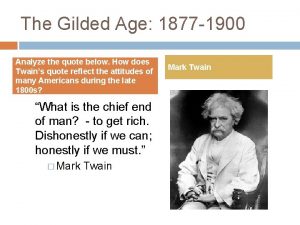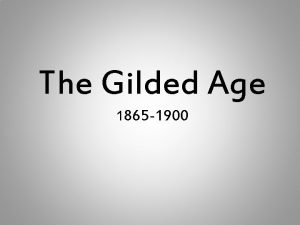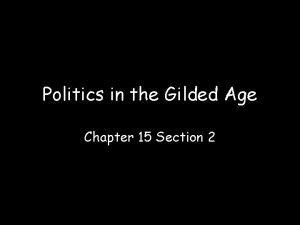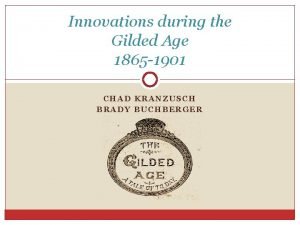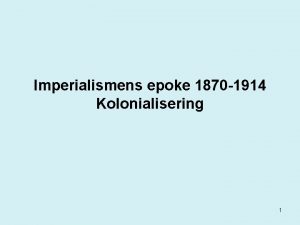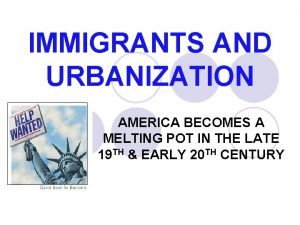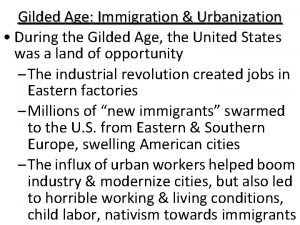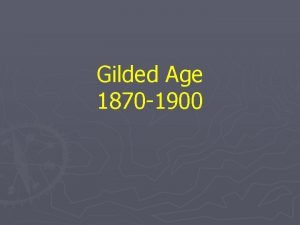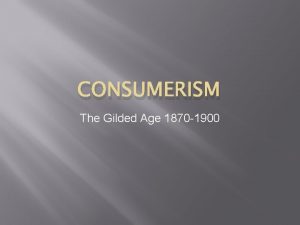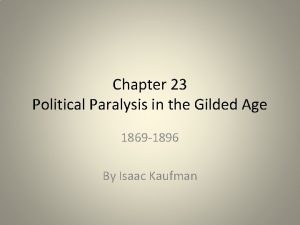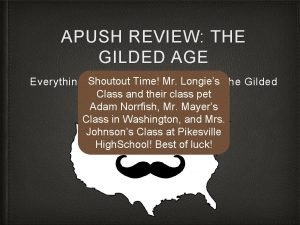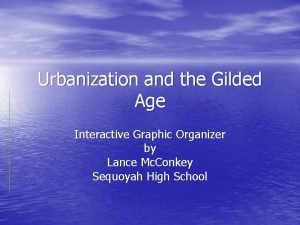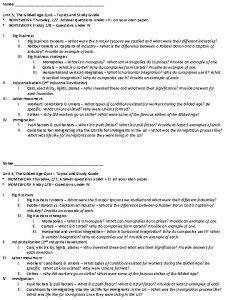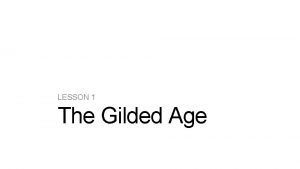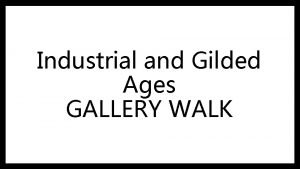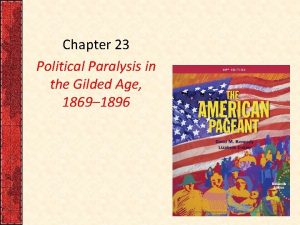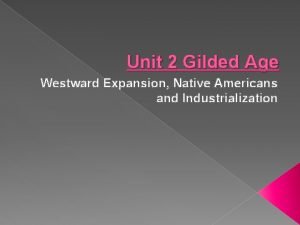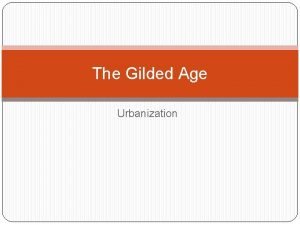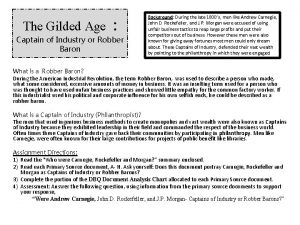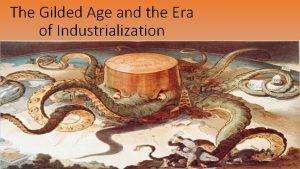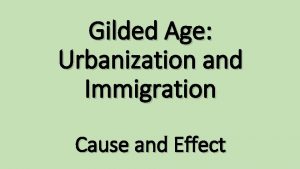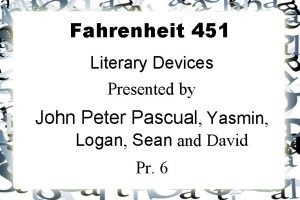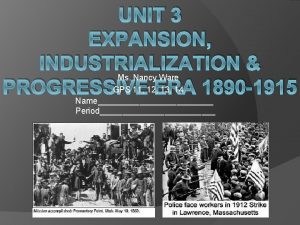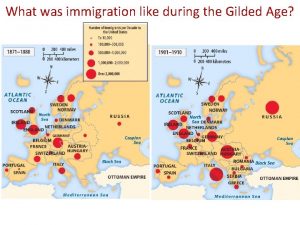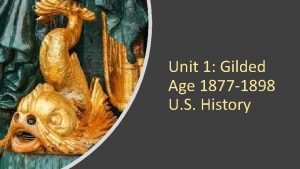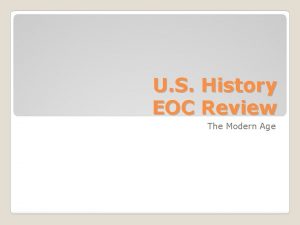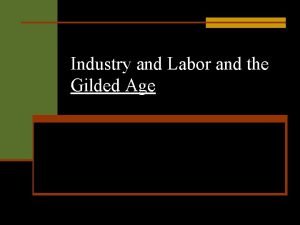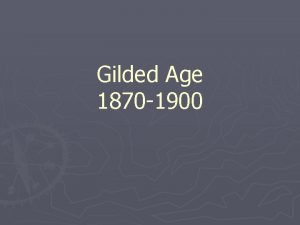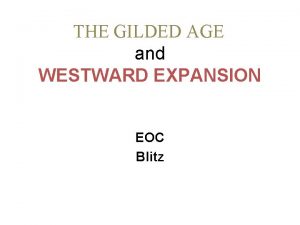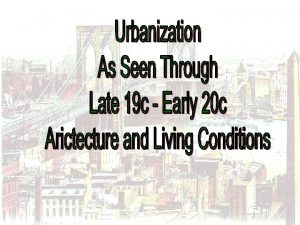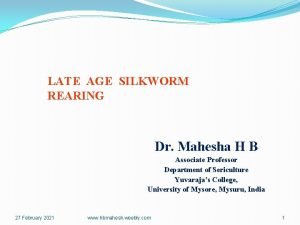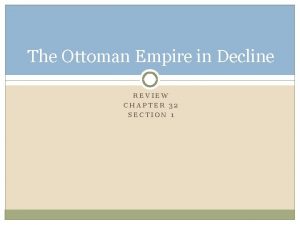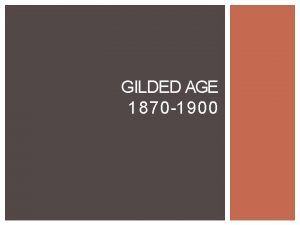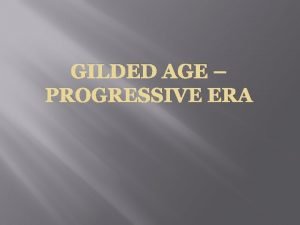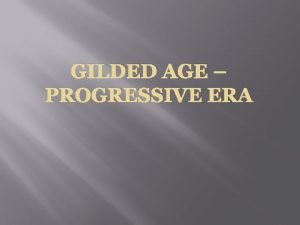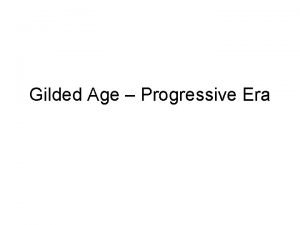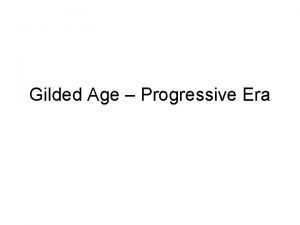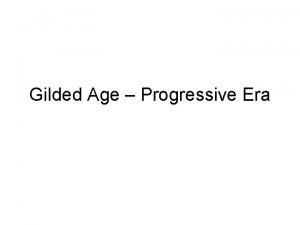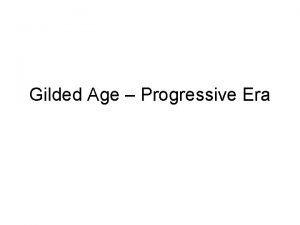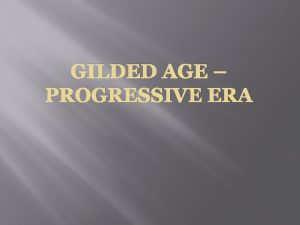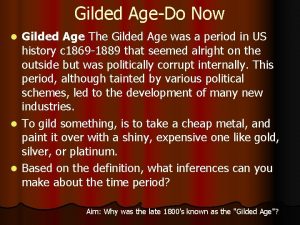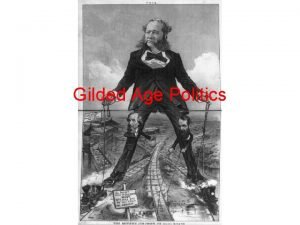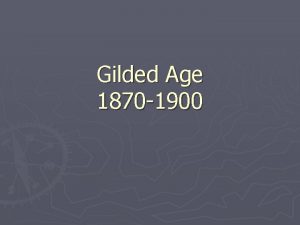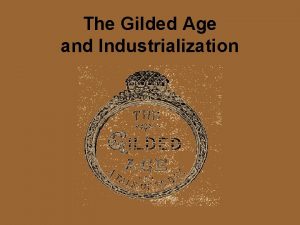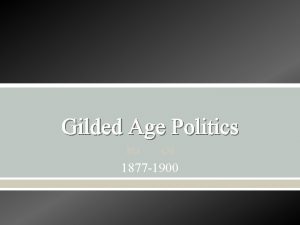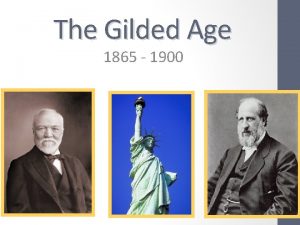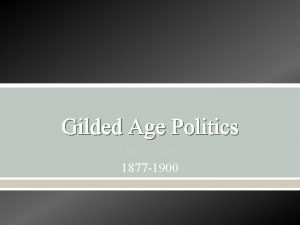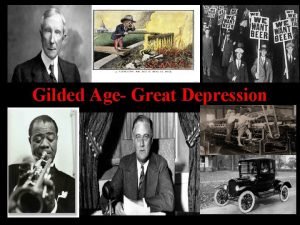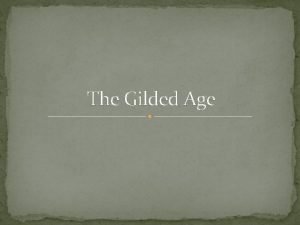Gilded Age Late 1800 s Gilded Age Name

















































- Slides: 49

Gilded Age Late 1800 s

Gilded Age Ø Name suggests that a thin but glittering layer of prosperity covered the poverty & corruption in America Ø Golden age for industrialists l l Their wealth helped to hide problems faced by immigrants, laborers, & farmers Also helped to hide widespread abuse of power in government

Gilded Age Ø Term coined by Mark Twain Ø Wrote book The Gilded Age in which he ridiculed Washington politicians of the day




Gilded Age Ø Speculators in land & stock quickly rose from “rags to riches” Ø Depressions, low wages, & rising farm debt contributed to discontent in the working class

Politics Ø Government operated on a laissez-faire approach to the economy l l Laissez-faire = government should not interfere in business Idea developed by Adam Smith in The Wealth of Nations in 1776


Politics Ø Businesses accepted government grants & subsidies l l l Industries such as the railroad are an example Businesses would give gifts of money to politicians to make sure such grants & subsidies continued to be given to their companies Between 1875 -1885, Central Pacific Railroad reportedly budgeted $500, 000 a year for bribes

Credit Mobilier Scandal Ø Congress gave the Union Pacific & Central Pacific Railroads loans & land to complete the first transcontinental railroad Ø Owners of Union Pacific hired the company Credit Mobilier to actually build their portion

Credit Mobilier Scandal Ø Credit Mobilier charged Union Pacific far more than the value of the work done l They gave cheap shares of stock to those in Congress that agreed to support more funding • Both political parties were guilty • A future President & Vice President, several cousins of Grant, & thirty other officials were caught

Spoils System Ø Elected official appointed friends & supporters to government jobs l l Sometimes people were not qualified By the Gilded Age, the government was swarming with unqualified, dishonest employees who used their office for their own profit (graft)

Belknap Scandal Ø Grant’s Secretary of War William Belknap & his wife had been receiving $6, 000 a year from John Evans l Evans paid them for having secured him a very lucrative trading post position at Fort Sill

Political Parties & their Constituents Ø Republicans l l Industrialists, bankers, & eastern farmers. Support strongest in North & upper Midwest Ø Democrats l l l People of less privilege, or people who felt that way Northern urban immigrants, laborers, western farmers, & southern planters Support strongest in the west & south


Reforming the Spoils System Ø After Rutherford B. Hayes was elected in 1877, he refused to use the spoils system (AKA patronage) l Appointed people who were qualified l Fired people not needed l Began the reform of the civil service, or government’s non-elected workers

Reforming the Spoils System Ø 1880: James A. Garfield wins election l l Supported reforms to civil service July 2, 1881: mentally unstable lawyer Charles Guiteau shot Garfield • Guiteau had expected a job from him • Murder caused further outcry against the spoils system

Reforming the Spoils System Ø Chester A. Arthur became President when Garfield was shot l l l He fought for & benefited from the patronage system in New York As President he fought against the spoils system Pendleton Civil Service Act of 1883 *** • Created Civil Service Commission • Many jobs required a fitness test for applicants

Election of 1884 Ø James G. Blaine (R) vs. Grover Cleveland (D) Ø Campaign focused on scandal despite serious problems in the country Ø Cleveland won. He was backed by big business, but: l He opposed high tariffs, took back 80 million acres of land from the railroads, & supported the gov. regulation of other powerful industries


Regulating Railroads Ø Began in 1869 after charges that railroads were overcharging customers Ø Corrupt practices l Charging more for short hauls than long hauls l Offering rebates to special customers l Keeping rates secret

Regulating Railroads Ø Munn v. Illinois l l 1887 case that allowed some states to regulate certain businesses within their borders It was an attempt to regulate railroads • It was later reversed

Regulating Railroads Ø 1887 Interstate Commerce Act l l First regulatory agency in U. S. Set up the ICC or Interstate Commerce Commission to enforce regulation ICC did not have the power to set railroad rates To enforce their rulings, the ICC had to take the railroads to court where they usually lost

Depression to Prosperity Ø Due to industrial growth, the economy grew in the late 1880 s & into the 1890 s. Ø Cleveland lost the 1888 election to Benjamin Harrison

Broadway Play Based on Panic of 1893

Depression to Prosperity Ø Harrison signed the Sherman Antitrust Act in 1890 l Ineffective at controlling big business l Ø 1892: Senator John Sherman (R) from Ohio Cleveland returns to the Presidency

Depression to Prosperity Ø 1893 a depression hit: l l Millions lose jobs & wages are slashed Government offered no help Ø Jacob Coxey / Coxey’s Army l l Demanded the government create jobs for the unemployed Called for the unemployed to march on Washington, but when they reach the capitol they are arrested

Coxey’s Army

Depression to Prosperity Ø 1896 Election: William Mc. Kinley won against William Jennings Bryan Ø 1900 Election: Mc. Kinley is reelected l l Sept. 6, 1901: Mc. Kinley was shot by Leon Czolgosz, a mentally ill man who called himself an anarchist Mc. Kinley’s Vice President, Theodore (Teddy) Roosevelt became President


Mc. Kinley Campaign Poster from 1896

Leon Czolgosz

Immigrant Experience Ø Reasons they left home country: l l l Crop failures Shortages of land and/or jobs Rising taxes Famine Escaping religious and/or political persecution Ø 1860: U. S. population = 31. 5 million Ø 1865 -1920 30 million additional people entered the U. S.

Immigrant Experience Ø Most immigrants came from Northwestern & central European countries l l l 2. 8 million Germans 1. 8 million British 1. 4 million Irish

Immigrant Experience Ø Immigrants entered the U. S. through several port cities, but 70% came through at New York City, the “Golden Door” at Ellis Island Ø 1892: Government required that all immigrants undergo a physical exam. l People with contagious diseases were quarantined or even deported

Immigrant Experience Ø Most immigrants settled in their port of entry l Ex= New York, Boston, Detroit, Chicago, etc. Ø Ghettos sprang up in cities l Due to restrictive covenants which prevented them from buying houses in certain areas Ø Many immigrants were discriminated against. They were thought to be mentally & physically inferior, especially the Chinese

Immigrant Experience l Chinese Exclusion Act of 1882: *** • Prohibited Chinese immigration to the U. S. • Lasted until 1943 l Asian students on the West coast were segregated from other students • Gentleman’s Agreement***: made between Japan & U. S. l Said that Japan would stop issuing passports to laborers coming to the U. S. if the United States would end its segregation policy

Immigrant Experience Ø Mexican Immigration l l l 1902: Newlands Reclamation Act passed to irrigate southwestern lands Mexican immigrants are hired to work new fertile farmland Immigration Restriction Act of 1921: limited immigration from Europe & Asia causing a labor shortage. • This drew Mexicans across the border


Expanding Cities Ø Major cities such as New York were bursting with people due to immigration & people moving from rural to urban areas l 1880 -1910 the number of people living on farms fell from 72% to 54% Ø Cable cars, electric trolleys, automobiles, & subways made transportation in cities easier l People began to move to the suburbs, or areas on the outskirts of the cities

Expanding Cities Ø As urban space became limited, buildings became taller l 1885: the nation’s first skyscraper, the Home Insurance Company Building was opened Ø Poverty, overcrowding, & neglect appeared l l Open sewers & lack of indoor plumbing spread disease Fire was a constant danger b/c of the closeness of buildings

10 stories & 138 ft tall Ø Demolished in 1931 Ø

Expanding Cities Ø Problems: l l l Overcrowding Neglect Poverty Disease Fire Ø Great Chicago Fire 1871 l l l 18, 000 buildings burned 250 people died Property damaged reached $200 million

Growth of Political Machines Ø Officials raised taxes & set up facilities to try to meet people’s needs l Gave government & officials more power l Misuse of funds occurred frequently

Political Machines Ø A single, powerful “boss” often controlled politics & government l l They would hand pick people to run for office & rig elections to ensure that they won. Leaders in the machines would perform services for residents in an area in exchange for votes

William Marcy “Boss” Tweed

Tweed Ø Most notorious and powerful political machine boss Ø He controlled Tammany Hall, the political club that ran New York’s Democratic Party Ø Thomas Nast helped to catch Tweed through his political cartoons

 Name 2 famous entrepreneurs of the gilded age
Name 2 famous entrepreneurs of the gilded age Stone age chronology
Stone age chronology Iron age bronze age stone age timeline
Iron age bronze age stone age timeline Entrepreneur gilded age
Entrepreneur gilded age Gilded age eoc blitz review
Gilded age eoc blitz review The gilded age vocabulary
The gilded age vocabulary The gilded age quotes
The gilded age quotes Gilded age time period
Gilded age time period Chapter 15 section 3 politics in the gilded age
Chapter 15 section 3 politics in the gilded age Inventions of the gilded age
Inventions of the gilded age The gilded age medvirkende
The gilded age medvirkende Melting pot gilded age
Melting pot gilded age Urbanization during the gilded age
Urbanization during the gilded age Gilded age president
Gilded age president Gilded age consumerism
Gilded age consumerism Chapter 23 political paralysis in the gilded age
Chapter 23 political paralysis in the gilded age Gilded age apush review
Gilded age apush review Gilded age graphic organizer
Gilded age graphic organizer The gilded age quiz
The gilded age quiz Lesson 1 politics and the gilded age
Lesson 1 politics and the gilded age Gilded age gallery walk
Gilded age gallery walk Chapter 23 political paralysis in the gilded age
Chapter 23 political paralysis in the gilded age Westward expansion acrostic poem
Westward expansion acrostic poem What is the message
What is the message Robber baron or captain of industry document set
Robber baron or captain of industry document set Vertical integration gilded age
Vertical integration gilded age Chapter 15 section 3 politics in the gilded age
Chapter 15 section 3 politics in the gilded age Gilded age cause and effect
Gilded age cause and effect Fahrenheit 451 literary devices
Fahrenheit 451 literary devices Promontory point gilded age definition
Promontory point gilded age definition Gilded age
Gilded age Gilded age strikes
Gilded age strikes The gilded age 1877 to 1898 worksheet answers
The gilded age 1877 to 1898 worksheet answers Gilded age eoc blitz review
Gilded age eoc blitz review Gilded age
Gilded age Gilded age
Gilded age Gilded age westward expansion
Gilded age westward expansion Cold war kahoot
Cold war kahoot Pallid politics in the gilded age
Pallid politics in the gilded age Wilson gorman tariff apush
Wilson gorman tariff apush Dumbell tenement
Dumbell tenement Chapter 23 political paralysis in the gilded age
Chapter 23 political paralysis in the gilded age Name a line containing point a
Name a line containing point a Most convenient method of silkworm bed cleaning is
Most convenient method of silkworm bed cleaning is Map of ottoman empire 1800
Map of ottoman empire 1800 Classical music eras
Classical music eras 4200 grade pay salary in uttarakhand
4200 grade pay salary in uttarakhand Nationalism i europa
Nationalism i europa British empire 1800
British empire 1800 1900s girls fashion
1900s girls fashion
